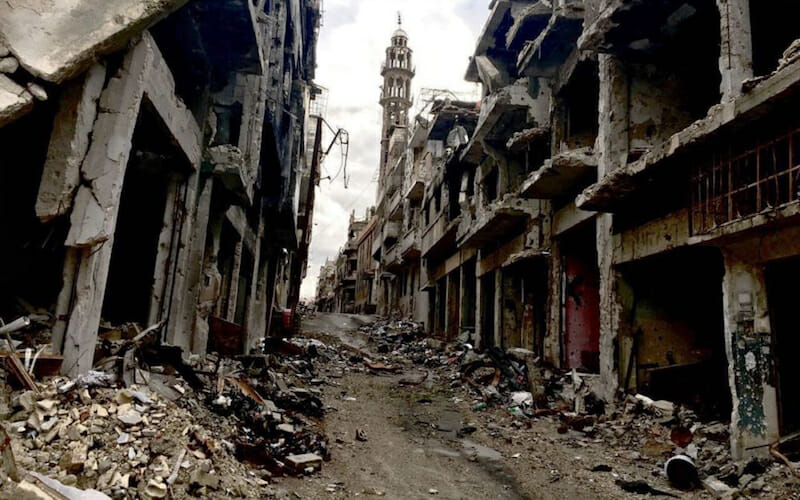
Why Iran May Lose ‘Strategic Depth’ in Syria
Iran teeters on the brink of economic and geopolitical bankruptcy as the specter of US-imposed sanctions looms large. Following US President Donald Trump’s unilateral withdrawal from the Iran nuclear deal, Washington has threatened to saddle the Islamic Republic of Iran with the “strongest sanctions in history” unless major European powers succeed in squeezing a better deal out of Tehran.
While the fate of the moribund nuclear pact is uncertain, Trump appears resolute in fully implementing his policy of “maximum pressure” on the Islamic Republic, seeking to precipitate the collapse of Iran’s economy and thereby forcibly persuade Tehran to change course. Trump and his foreign policy team also hope that by dint of imposing severe economic sanctions, the Islamic Republic will be coerced into restraining or even terminating its geopolitical ambitions in Syria.
Facing mounting economic pressure, Iran’s leaders have pushed Germany, France, and the United Kingdom to hammer out a workable plan to save the nuclear deal. Under geopolitical duress in Syria, Iran is also making sure that Russians will stand alongside Tehran at times of economic difficulty and that they will not stoop to Israeli and US calls for Iran and its proxies’ expulsion from Syria.
To no avail, however, it appears that Iran is confronted with a fait accompli. Not only have the major European powers failed (so far) to deliver on their promises of salvaging the nuclear deal, Russia has also shown signs of tactical (if not strategic) realignment with both Washington and Tel Aviv in Syria.
The big question now is will Iran be able to preserve its strategic depth in Syrian in the face of mounting economic pressure and the recent US-Russia détente?
Russia brokering modus vivendi between Iran-Israel
Since June 2013, Iran has been supporting Bashar al-Assad’s regime and making the most of every opportunity to expand its geopolitical foothold in Syria under the aegis of Russia. The demise of the Islamic State in tandem with the growing weakening of the rebels from Daraa in the restive south to Aleppo in the north have resulted in emergence of a geopolitical vacuum for key players like Iran to fill.
Meanwhile, much of southwest Syria, which is considered a de-escalation zone agreed to by the US, Russia and Jordan, has recently become a fertile ground for a potential military conflict between Iran and Israel.
Some Iranian proxies dressed in Syrian military uniforms were reportedly seen in the strategic areas of Daraa and Quneitra along the border with the Israeli-occupied Golan Height. Consequently, Israeli officials have been vociferously urging Russia for complete withdrawal of the Iranians and Shi’ite militias. Israeli officials have gone so far as to reject Moscow’s offer to keep Iran 100 km (62 miles) away from Israel’s northern border.

As Trump and his Russian counterpart Vladimir Putin headed for their historic Helsinki summit, speculations were rife that a “grand bargain” over Syria would emerge from their discussion. A bargain under which the US would agree to lift Ukraine-linked sanctions on Russia in exchange for ousting Iran and its proxies from Syria.
It is too early to say that the Helsinki summit, regardless of all its historic characteristics, has sealed the fate of Iran’s military presence in Syria. Besides, Israel and Russia are still at odds over the limits of Iranian activity in Syria. Nevertheless, Trump and Putin must have exchanged views and even reached a consensus on the Israeli’s concern over Iran’s growing involvement in Syria close to the disputed Syrian-Israeli border.
Only a few days prior to the Helsinki summit, Putin had met with Israeli Prime Minister Benjamin Netanyahu who in the meeting told the Russian president that “Iran needs to leave Syria.” On the same day, Iran dispatched Ali Akbar Velayati, a top adviser to Supreme Leader Ayatollah Ali Khamenei, to Moscow to convey an important message from Khamenei and Rouhani to Putin.
To be sure, Iranian leaders wanted to make sure that Russia would not sell out Iran on Syria as rifts had already been growing in Tehran over Moscow’s “ulterior motives” and its recent overtures with Israel. Add to Tehran’s concerns the recent statement by Russian Foreign Minister Sergei Lavrov that “only Syrian government troops should have a presence on the country’s southern border.”
Lavrov’s statement was a veiled reference to Iran-affiliated militias as well as a telltale sign of Russia’s adamant willingness to rapidly conclude the military phase in Syria and expedite the political phase of reconciliation under the Astana deal. Therefore, at this critical juncture the last thing Russia as a major power broker needs is another military conflict, this time between Iran and Israel in southern Syria.
Russia’s pragmatism vs. Iran’s Syrian dilemma
Mindful of both Iranian and Israeli conflicting interests and concerns in Syria, Russia is trying to prevent the two from engaging in a risky and unnecessary war in Syria, which would have negative geopolitical and security ramifications for the region. The perplexing problem, however, is that Russia’s multiple diplomatic overtures with Israel over the past few months are being construed by Tehran as pulling the rug from under the feet of the well-entrenched “axis of resistance” in Syria.
Much to the dismay of Iran, however, Russia seeks to strike a balance between Israeli and Iranian interests while simultaneously signaling to Tehran that Moscow will only tolerate Iran’s military presence under two specific circumstances. First, Iran’s military presence should not comprise the broader military and political achievements made during seven years of mayhem and bloodshed in Syria, and second, it is much preferable if it contributes to further enhancement of Russia’s geopolitical interests in the war-ravaged country.
Unlike what Kremlin thinks in strategic terms, Iran considers any decisions by Russia aimed at minimizing Tehran’s influence in Syria as a disservice to the “axis of resistance” by ignoring the money spent and the manpower the Iranian regime provided for the sake of Syria and the war against ISIS.
All of which have taken place at an unpropitious time for Iran because the US is poised to snapback economic sanctions on Iran beginning from August and later in November. The socio-economic situation inside Iran is even more dangerous. Iran’s currency crisis along with the rising dissatisfaction of the populace over the government’s failure to address these pressing issues has brought the country closer to economic collapse. On top of that, the Trump administration has unleashed comprehensive diplomatic efforts to convince nations to slash oil imports from Iran to zero.
Therefore, if Iran fails to export enough oil to finance the costs of its military presence in Syria, then it will most likely lose its overall ‘strategic depth’ and confine itself to merely a political clout. More to the point, both Trump and Putin are very well aware that Iran will not be able to maintain its military influence in Syria under fierce internal and external pressures.
When it comes to Syria, Russian pragmatism dictates that at this stage more than foreign countries’ military presence, the country is in dire need of political reconciliation process. In line with this logic, both Russia and the US have started to work albeit tactically toward narrowing down their immediate differences over Syria, not necessary because their interests may dovetail with each other, but primarily because they see the Syrian case as a litmus test for improving bilateral relations.
As mentioned earlier, the Trump-Putin summit may have not yet sealed the fate of Iran’s military presence in Syria but the myriads of economic problems Iran is facing coupled with the return of US-orchestrated sanctions will make it extremely difficult and almost improbable for Tehran to preserve its military posture in Syria and beyond.
Iran faces a disturbing dilemma: if it obstinately pursues its quest for keeping strategic-military depth in Syria, it will inevitably entangle itself in a direct military conflict with Israel. If it decides to leave Syria, either because of domestic pressure or due to US-Russia’s demands, that will be a total embarrassment for Iranian leaders. For the time being, Iran’s dangerous Syrian quest has only brought it closer to economic and geopolitical failure.

